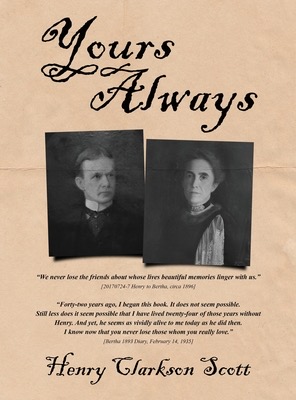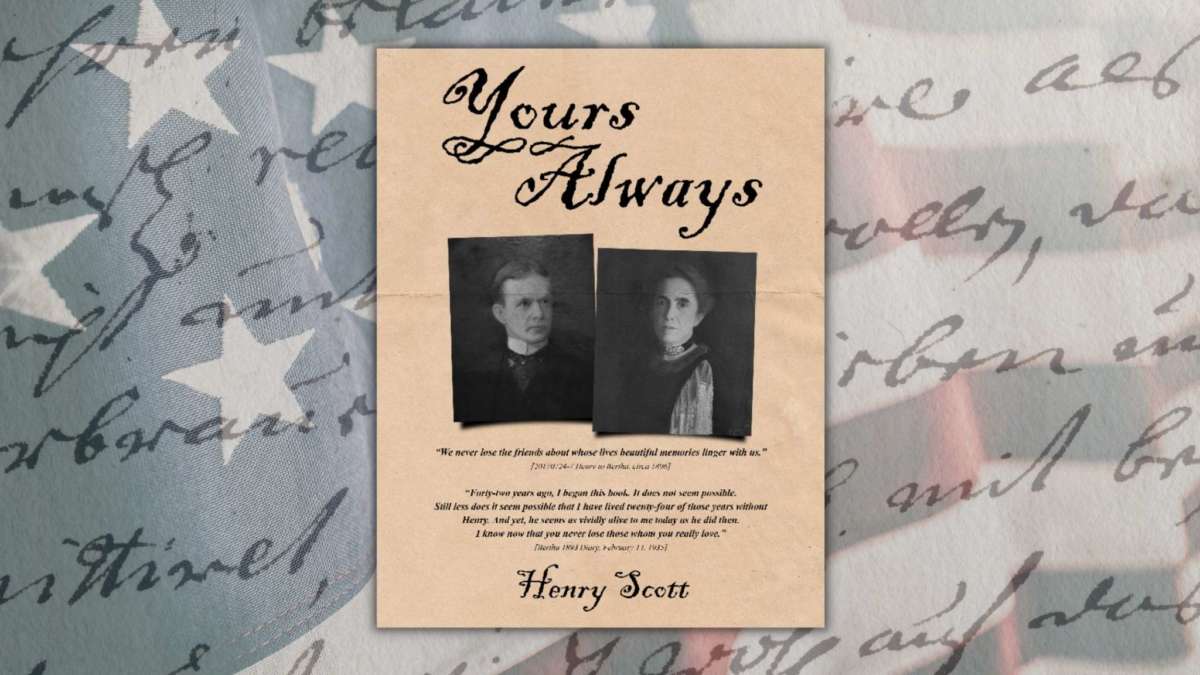Yours Always by Henry Scott
Theirs was an unlikely match. Isn’t that how all great love stories start? A Southern man, forced to rebuild his life after the Civil War, falls in love with a Northern woman with pedigree. It sounds like something straight out of a Nicholas Sparks novel. Only this story is real and much more genuine.
Henry Scott’s Yours Always (Gatekeeper Press) brings together letters, diary entries and newspaper articles to create a time capsule filled with the enduring love story of his great-grandparents, Henry Clark Scott and Bertha Warburton Drake. The story is one that has been passed down through generations of the Scott family. Author Henry Scott received the letters from his father, Hugh Scott Jr., who got the letters from his grandmother Bertha herself.
And what a wealth of storytelling material there is. The letters between Henry’s great-grandmother and great-grandfather alone — some 1,500 in all — span more than two decades that include their engagement in 1892 through to the events leading up to Henry’s tragic death in 1911. Nearly every letter closes with the devoted phrase: “yours always.”
A LOVE STORY FOR THE AGES
Henry and Bertha seemed to come from two different worlds: Bertha, who was from a wealthy New England Yankee family, had been raised in a life of luxury; and Henry was raised in Fredericksburg, VA, in a well-to-do merchant family — until the Civil War devasted their wealth and his economic prospects along with it. Of course, their kind of love story couldn’t be without trials. Bertha’s father, George Silas Drake, was a man of wealth and a high social standing, so naturally, he had his reservations about his daughter marrying a man now lacking in those areas. But Henry’s motivation and will were strong, and he persisted in making his intentions known.
Bertha’s father gave Henry a task list of sorts that needed to be completed before he would allow them to marry. He wanted Henry to be able to provide Bertha with the kind of life she had become accustomed to living. Her father assumed that since Henry was new to the Drakes’ adopted home of St. Louis, he wouldn’t have the connections to make these prerequisites happen. More important than having connections, however, is the determination of a man’s heart to have the woman he loves. Henry constantly worked to build a business that would afford Bertha a comfortable life, determined to earn her father’s blessing of marriage. Shocked with his success, George still chose to ignore their wish to marry.
Eventually, his avoidance strategy backfired on him. Bertha and Henry couldn’t wait another minute, so they took matters into their own hands. One summer when Henry visited Bertha in Rye Beach (which was appropriate for a courting couple), he took Bertha, her chaperons and several friends to a small group of islands via ferry to spend the day. Henry and Bertha gave their group the slip and, in a secluded spot by the ocean, Henry made his proposal of marriage and Bertha accepted. But that offer and acceptance was hardly the end of their trials: the “happy” couple were forced to go through three additional years of waiting before they were finally married.
A METICULOUSLY RESEARCHED FAMILY HISTORY
Yours Always takes us through the years of Bertha and Henry’s marriage in all its ups and downs: the grief of miscarriage and joy of parenting; lonely days of separation and fond memories of time spent together; ill-health and rejuvenation. In the process, Scott uncovers a more complex story behind the family lore surrounding the couple. He also provides a rich background of family history against which the love story plays out: the Scott family’s arrival in America, the privilege and royal pedigree of the Drake family.
Countless hours of research have gone into the book, and it certainly shows. Yours Always has been a true labor of love for the Scott family. I can only imagine the challenges involved in gathering all the details about two lives that lived so long ago, even with the letters and diary entries as a foundation. Every detail of their lives has been carefully documented, from Henry and Bertha’s childhoods to their courtship, their “scandalous” engagement, Henry’s untimely end, and the long years during which the widowed Bertha witnessed her children grow up and have children of their own.
I came away from this story learning an important lesson: no matter the time period, we are all bonded through our adventures of love, family and the human experience. Closing in on her seventieth year, Bertha writes in her diary: “I have lived twenty-four … years without Henry. And yet he seems as vividly alive to me today as he did then. I know now that you never lose those whom you really love.”
Yours Always is proof that loved ones continue to live on, as long as others are willing to share their stories through the generations.





